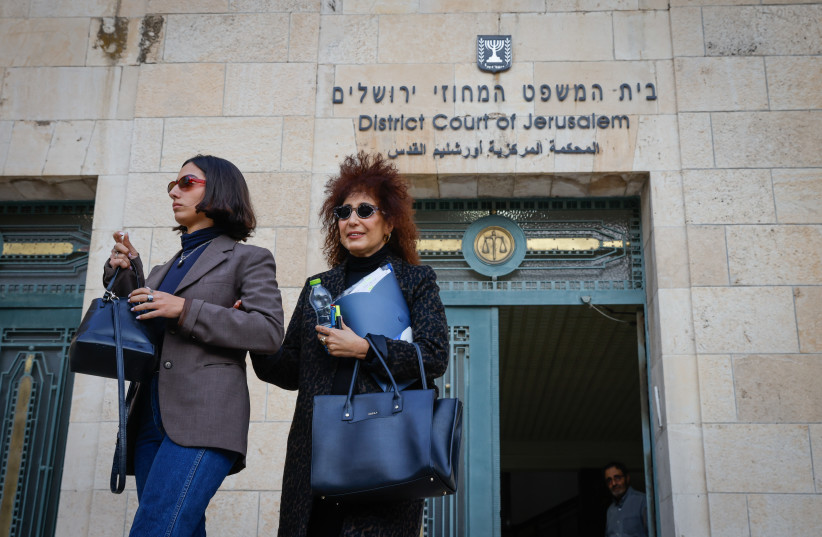Erdan denies he was ousted as communications minister over Elovitch complaints to Netanyahu
Ambassador to the UN Gilad Erdan on Monday testified that he had no knowledge of a link between the end of his tenure as communications minister from 2013-2014 and complaints about his telecommunications reforms by Bezeq owner Shaul Elovitch to Prime Minister Benjamin Netanyahu.
Erdan took the stand at Netanyahu’s corruption trial at the Jerusalem District Court for the first time on Monday to testify about Case 4000, in which Netanyahu is alleged to have sought regulatory changes and blocked reforms on behalf of Elovitch in return for positive coverage in the businessman’s Walla news organization.
The prosecution sought to demonstrate that telecommunications reforms developed by Erdan during his time as communications minister in 2014 had been hindered by Netanyahu on behalf of Bezeq. The reforms would have reduced Bezeq’s stranglehold on the telecommunications market. They included a regulation to push the former state company to lease cable lines and infrastructure it had inherited from its time as a state company. The reforms were eventually implemented after being delayed.
Statements made during the trial
“I have no knowledge that there is a connection,” Erdan said when asked by the defense if he had been removed from the ministry due to Elovitch’s complaints about his reforms.
When asked by the prosecution if Elovitch warned him about his connections to Netanyahu in his complaints, he said Elovitch had alluded to connections in the government.
 Yifat Ben-Hai Segev seen after a court hearing in the trial against former Israeli prime minister Benjamin Netanyahu, at the District Court in Jerusalem on December 13, 2022. (credit: OLIVIER FITOUSSI/FLASH90)
Yifat Ben-Hai Segev seen after a court hearing in the trial against former Israeli prime minister Benjamin Netanyahu, at the District Court in Jerusalem on December 13, 2022. (credit: OLIVIER FITOUSSI/FLASH90)Erdan said in the course of his work in many ministries, he often encountered those who would boast of connections and threatened to use them to fight against ministries, and he treated Elovitch’s bluster as no different.
In dealing with Elovitch, “I did not receive instructions from the prime minister,” Erdan said.
Netanyahu is accused of appointing loyalist Shlomo Filber as Communications Ministry director-general to advance Bezeq’s interest as part of the deal with Elovitch. The move to allow smaller telecommunications companies to lay their cables in ducts built by Bezeq was reportedly frozen by Filber.
Filber is alleged to have worked on behalf of Netanyahu and Elovitch to weaken restrictions and regulations to facilitate a more profitable merger between Bezeq and YES, both of which were owned by Elovitch.
“Netanyahu spoke to me once on this issue [telecommunications reforms] and asked if I am paying attention to Bezeq’s complaints,” Erdan said. “I don’t know if he knew all the details [of the reforms], and I didn’t get into them with him.”
Erdan said he had assured Netanyahu that he listened to Bezeq’s complaints.
When the prosecution asked if Erdan was concerned about the continuation of the reforms after his tenure as communications minister, he said he was, but it fell in line with other regulations and policies that he had developed.
“I believed [in the reform],” Erdan said, which had also been advocated by his predecessor, Moshe Kahlon. “I decided to use all my political and public power to push it.”
The now-privatized Bezeq had inherited a lot of infrastructure from its days as a state company, he said, adding that the reform aimed to create more competition, thereby leading to better prices and services.
The defense attempted to challenge the narrative of the prosecution by demonstrating how Netanyahu had taken actions during Erdan’s tenure that helped advance the reforms, or at least that he took no actions to interfere with Erdan’s anti-monopolist agenda.
The defense presented meeting minutes from the Prime Minister’s Office that called for the implementation of the reforms. Erdan agreed with attorneys that Netanyahu could have struck the matter from the records if he wanted.
While the move had been approved by other official bodies, including the Communications Ministry’s legal advisers and the Antitrust Authority, Erdan reportedly expressed concern about the monopolistic character of the resulting company.
“You’re calm after all this [that] Bezeq won’t strengthen in the market much more with the merged capabilities of YES?” Erdan said he had asked the Antitrust Authority.
Both Elovitch and Netanyahu are charged with bribery, and Netanyahu is also charged with fraud and breach of trust.
During his testimony, Erdan at times seemed exasperated with some of the prosecution’s questions. He mainly had a jovial tone with both the prosecution and defense teams, but he appeared more ready to joke about the matters with Netanyahu’s lawyers.
At the beginning of the hearing, the court said it had approved the state’s request to have Israeli businessman Arnon Milchan testify through a video call.
The defense challenged the move, but Milchan refused to take the stand under other conditions, as he is ostensibly unwell and unable to travel. The court approved the remote testimony in light of Milchan’s importance as a witness.





Comments are closed.